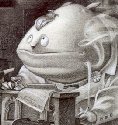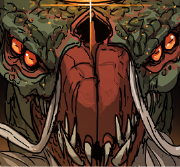|
paranoid randroid posted:ill counter with the word "fly" That's pretty fly if you ask me
|
|
|
|

|
| # ? May 23, 2024 11:31 |
|
Begemot posted:Yeah, where to put the emphasis in a word is really the tricky part. That's where the patchwork vocabulary comes into play, sometimes the pronunciation is the same as the original language, sometimes it's how it was two hundred years ago, sometimes it's just different because it shifted over time. https://twitter.com/MattAndersonNYT/status/772002757222002688
|
|
|
|
Isn't there also a rule about vowel/constant sounds in a list? There is a reason Tock Tick sounds terrible
|
|
|
|
Tulip posted:The actual weirdest piece of English stuff I can think of is verb conjugation, for example take present tense of 'to run' When I was a kid, my parents actually bought me one of those subscription encyclopedias, and one day, dead bored, I decided to see what the longest entry in the dictionary was Near as I could tell it was "run"
|
|
|
|
Phy posted:When I was a kid, my parents actually bought me one of those subscription encyclopedias, and one day, dead bored, I decided to see what the longest entry in the dictionary was Got like 6 distinct uses just off the top of my head so this checks out imo
|
|
|
|
Twibbit posted:Isn't there also a rule about vowel/constant sounds in a list? There is a reason Tock Tick sounds terrible That I think is also a Celtic hold over, like "hickory dickory dock." More subtle and weird is our adjective rules. Like, compare She wore an amazing red coat. She wore a red amazing coat. That second should sound weird to most native English speakers, because we near-always put the overall opinion before the color in a list of adjectives for the same noun. It's also a great lesson in why teaching ESL is such a pain in the rear end, because basically no native English speakers notice this intellectually, even though they basically all follow it in practice, so it's hard to explain to an ESL student why they shouldn't say "red amazing coat." paranoid randroid posted:ill counter with the word "fly" Eh, English does have a lot of homophony but the only other languages I know at all are Japanese, Chinese, and Nepali, and English has by far the least homophone shenanigans. Chinese looks at 'fly' and goes "watch this." That said, lead/lead and read/read is some bullshit, our spelling system is a nightmare.
|
|
|
|
Phy posted:When I was a kid, my parents actually bought me one of those subscription encyclopedias, and one day, dead bored, I decided to see what the longest entry in the dictionary was I believe the word with the most meanings is "set", or at least that's what I've read elsewhere.
|
|
|
|
Twibbit posted:Isn't there also a rule about vowel/constant sounds in a list? There is a reason Tock Tick sounds terrible ablaut reduplication
|
|
|
|
Tulip posted:
Aren't Chinese phonemes distinguished by tone, though? Difficult to learn, sure, but not exact homophones once you know how to distinguish them.
|
|
|
|
Do other languages have that adjective order bit, or is that mostly English?
|
|
|
|
Glagha posted:Do other languages have that adjective order bit, or is that mostly English? Chinese also has an adjective order, and it's similar to the English order, off the top of my head.
|
|
|
|
Daktar posted:Aren't Chinese phonemes distinguished by tone, though? Difficult to learn, sure, but not exact homophones once you know how to distinguish them. Are they not also different characters, rather than English and our love of the same exact arrangement of characters having different meanings based on the other words around them?
|
|
|
|
when I first saw this, I thought that Chinese grammatical order deviated pretty significantly from English, but it actually is the same. It's just Japanese that somehow got hosed up with SOV order instead. Still, Chinese is bullshit on account of the huge amount of idioms it's got packed in
|
|
|
|
|
This thread has great derails
|
|
|
Shugojin posted:Are they not also different characters, rather than English and our love of the same exact arrangement of characters having different meanings based on the other words around them? every word gets its own character  but if you need to arrange them together the compound word becomes bullshit & also sometimes they just yoink random characters to use as noises for loanwords but if you need to arrange them together the compound word becomes bullshit & also sometimes they just yoink random characters to use as noises for loanwords
|
|
|
|
|
Shugojin posted:Are they not also different characters, rather than English and our love of the same exact arrangement of characters having different meanings based on the other words around them? Also there are only 4 tones, large numbers of words absolutely sound exactly the same. It would in fact be more difficult to find words with distinct pronunciations not covered by another word. Even for words that are pronounced differently the fact that a lot of them are short consonant+vowel combinations means that it can be very easy to confuse different words. This is to the point where there is a distinct oral version of 1 that is used when reciting a string of numbers because the standard version of 1 sounds too close to 7 (sort of like if everyone uses the military phonetic alphabet version of "niner" in place of nine, except that yāo sounds nothing like yī) This is helped by the fact that actual Chinese "words" are often essentially compound words, even moreso than English (moreso than even something like German I would assume).
|
|
|
Glagha posted:Do other languages have that adjective order bit, or is that mostly English? I know French and Spanish have their own set of adjective orders, since in those two languages adjectives can either come before or after the noun they modify, with some categories almost always coming before, and others almost always after, and some being either. For instance, "goodness" adjectives go first, so it's always bon appétit, but never l'appétit bon.
|
|
|
|
|
Shugojin posted:Are they not also different characters, rather than English and our love of the same exact arrangement of characters having different meanings based on the other words around them? A fun game is to name as many English words as you can that change pronunciation when their first letter is capitalized.
|
|
|
|
Daktar posted:Aren't Chinese phonemes distinguished by tone, though? Difficult to learn, sure, but not exact homophones once you know how to distinguish them. So, in Mandarin (which the shi poem is intended for), there's 4 tones. In the case of the shi poem you're up to 4x1, so 4 different sounds, which are all quite close (this is the deliberate joke of the poem). Extending to the rest of the language, modern Mandarin only has about 1200 syllables (English has about 8000), and most words are short (1-2 syllables in Mandarin). If you ever study it, you'll hit homophones probably within the first week. This of course means that puns are way more common. Anyway the point is that English is fairly tame on homophones, cuz English is very permissive about pronunciation on loan words and surprisingly flexible about bludgeoning latin/greek into long words. The largest homophone stack I've seen in English is 7 (raise rays raze rehs res reais rase, those last four being hard scrabble words). Japanese by contrast has a 22 (kiko) and Chinese a 149 (yi4). Seizon posted:when I first saw this, I thought that Chinese grammatical order deviated pretty significantly from English, but it actually is the same. It's just Japanese that somehow got hosed up with SOV order instead. Still, Chinese is bullshit on account of the huge amount of idioms it's got packed in SOV's pretty common - all the Sanskritic languages, plus Korean and Japanese, and I think Ancient Greek and Latin if I'm remembering my drunk conversations right. Irish is VSO which seems way more annoying. Chinese is weirdly similar to English. Relatively light on the word fusion stuff that German and Japanese do, same order on verbs, similar disregard for conjugation. It was a trip for me to take after getting used to Japanese because I'd assumed that it was going to be radically different. SneezeOfTheDecade posted:A fun game is to name as many English words as you can that change pronunciation when their first letter is capitalized. Honestly? It is incredible bullshit that we have words whose pronunciation changes based on vowels that come later in the word. Like, for example, com/come, which isn't even the same as con/cone.
|
|
|
|
Algid posted:Homographs exist too in addition to the humongous amount of homophones. Also, from the few months I spent in Beijing a lifetime ago, you have to add an R to the end of every word. It's like finding out where all the dropped r's from Boston went.
|
|
|
|
habeasdorkus posted:Also, from the few months I spent in Beijing a lifetime ago, you have to add an R to the end of every word. It's like finding out where all the dropped r's from Boston went. This is a "local" verbal quirk, though due to the population distribution and amount of media going through Beijing it's essentially intelligible to everyone who understands Mandarin. I was born in Henan and it's pretty much impossible for me not to not use erhua for certain words/phrases.
|
|
|
|
Tulip posted:Honestly? It is incredible bullshit that we have words whose pronunciation changes based on vowels that come later in the word. Like, for example, com/come, which isn't even the same as con/cone. That reminds me of that trick where a whole paragraph of English can have everything but the first and last letter in each word scrambled and it's still totally recognizable. Is that as easy in other languages?
|
|
|
|
SneezeOfTheDecade posted:A fun game is to name as many English words as you can that change pronunciation when their first letter is capitalized. Or with proper nouns, where it change depending on the person or specific location, see: Moscow, Russia vs Moscow, Idaho or Cairo, Egypt vs Cairo, Illinois 
|
|
|
|
Old Kentucky Shark posted:I know French and Spanish have their own set of adjective orders, since in those two languages adjectives can either come before or after the noun they modify, with some categories almost always coming before, and others almost always after, and some being either. For instance, "goodness" adjectives go first, so it's always bon appétit, but never l'appétit bon. Sometimes an adjective will change its meaning depending on whether it's before or after the noun. For example: "un grand homme": "a great man" "un homme grand": "a large man" but inversely: "un petit homme": "a little man" "un homme petit": "a petty man" In other cases, putting the adjective at the "wrong" place can serve to emphasize it. "un immense espace": "a huge space" "un espace immense": "a huge space" Dr Subterfuge posted:That reminds me of that trick where a whole paragraph of English can have everything but the first and last letter in each word scrambled and it's still totally recognizable. Is that as easy in other languages? Yes, I saw that joke translated in other languages and it still worked. For certain languages such as German, though, keep in mind that words are often glued together. Scramble each word separately even if there are no spaces between them, at least when the word starts being quite big. I mean, if you scramble Rechtsschutzversicherungsgesellschaft, I don't think keeping the R at the start and the t at the end will really help. If you split it as Rechts/schutz/versicherungs/gesellschaft it should already be easier.
|
|
|
|
Dr Subterfuge posted:That reminds me of that trick where a whole paragraph of English can have everything but the first and last letter in each word scrambled and it's still totally recognizable. Is that as easy in other languages? That's not true, it only works if the word is short.
|
|
|
|
habeasdorkus posted:Also, from the few months I spent in Beijing a lifetime ago, you have to add an R to the end of every word. It's like finding out where all the dropped r's from Boston went. This is very true. er-hua is real. I heard someone talk about asking a taxi driver to take you to Tiananmen, they said 'tierarmer'.
|
|
|
|
Tagichatn posted:That's not true, it only works if the word is short. I didn't mean to suggest I thought a paragraph filled with stuff like ahoionprthpmroc would be trivially parsed.
|
|
|
|
I had forgotten about the whole devil drink and that they weren’t speaking English.
|
|
|
|
SOV is more common than SVO, I'm pretty sure.
|
|
|
|
Tagichatn posted:That's not true, it only works if the word is short. Slpmiy rnisreveg the wdros altnerappy ptnesers the redaer wtih the msot dtluciffiy tguohh. Maybe shuffling the letters allows you to more quickly see the letters you actually need to identify the word?
|
|
|
Tulip posted:So, in Mandarin (which the shi poem is intended for), there's 4 tones. In the case of the shi poem you're up to 4x1, so 4 different sounds, which are all quite close (this is the deliberate joke of the poem). Extending to the rest of the language, modern Mandarin only has about 1200 syllables (English has about 8000), and most words are short (1-2 syllables in Mandarin). If you ever study it, you'll hit homophones probably within the first week. This of course means that puns are way more common. That's really cool, actually. I didn't realize the structure was so widespread! I'm kind of curious which language throne's speech is most similar too now, lol
|
|
|
|
|
maswastaken posted:I don't think I'm so unique in being able to do "anthropomorphic" up there at a glance. Context and familiarity go a very long way. I don't think you are either - I picked it up within a few seconds - but I considered "Ienobivccanle!" as a response and realized, looking at it, that even knowing what it was I was struggling to fit the letters in place. "Inconceivable!" I think a lot of it depends on either letter uniqueness or having momentum from previous words in the sentence. (As an example, I think "pitcninoroaun" is harder to decipher bereft of the context of "It is irencldibe bhlsluit taht we hvae wrods wsohe pitcninoroaun cehgans besad on vwloes taht cmoe leatr in the wrod.".
|
|
|
|
SneezeOfTheDecade posted:As an example, I think "pitcninoroaun" is harder to decipher bereft of the context of "It is irencldibe bhlsluit taht we hvae wrods wsohe pitcninoroaun cehgans besad on vwloes taht cmoe leatr in the wrod.". Yeah, I didn't see it when it was alone but that sentence parses immediately. Brains are cool.
|
|
|
|
Renaissance Robot posted:That example is dumb because nobody has ever used buffalo as a verb I will die on this hill Uh, well... hope the hill is a pretty place for a grave at least.
|
|
|
|
Shoehead posted:This thread has great derails I genuinely forgot what thread I was reading by the time I got to this post. Not a complaint.
|
|
|
|
Seizon posted:That's really cool, actually. I didn't realize the structure was so widespread! I'm kind of curious which language throne's speech is most similar too now, lol
|
|
|
|
PMush Perfect posted:Abaddon already does so much, please don't encourage them to also start creating conlangs. "Sorry guys, the page is gonna be delayed, in working on redoing the conjugation of future imperfect verbs for middle-low draconic." Of course he's already using the comic artist's trick for languages: just draw a bunch of weird symbols that don't mean anything in the word balloons.
|
|
|
|
Begemot posted:Of course he's already using the comic artist's trick for languages: just draw a bunch of weird symbols that don't mean anything in the word balloons. What if they do mean something though
|
|
|
|
Yeah. You can always pull a Doop.
|
|
|
|
|

|
| # ? May 23, 2024 11:31 |
|
Begemot posted:"Sorry guys, the page is gonna be delayed, in working on redoing the conjugation of future imperfect verbs for middle-low draconic." I've always been fond of the Asterix method where foreign languages are just people speaking intelligibly to the reader but with a funny font. Except for the Egyptians. 
|
|
|

















































